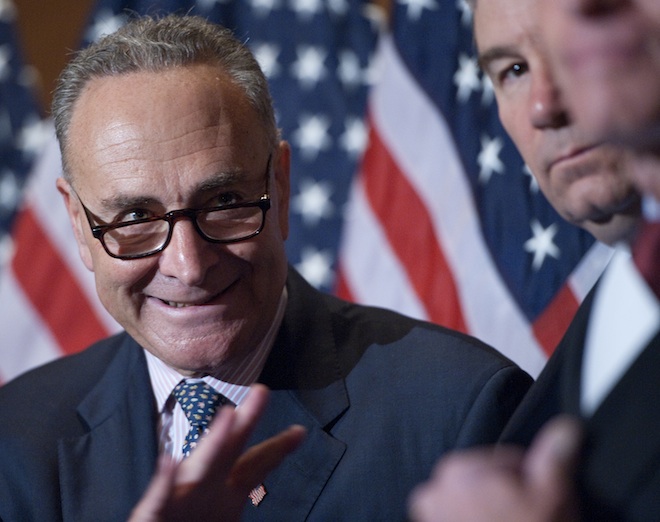Sen. Chuck Schumer (D-NY) wants to stop some of his own colleagues from making a big mistake — one that he and many tax experts believe will result in either larger deficits or higher taxes on the middle class.
Specifically, he’s publicly urging Democrats to abandon a tax reform model that calls for ending tax expenditures, many of which benefit middle income earners, in order to finance a large tax rate cut for wealthier people. It’s a framework that’s popular among economists, particularly conservative ones, but that a group of Democrats negotiating with Republicans to avert large tax increases and sharp spending cuts next year have also embraced.
Instead, he proposes targeting tax loopholes and deductions that benefit top earners and raising their top income tax rate, while simultaneously narrowing the tax code’s preference for capital gains by ratcheting up the capital gains rate from its current, historically low rate of 15 percent. Taken altogether it’s a call for significantly more revenue from high-income earners than Dems have sought by proposing to allow the Bush tax cuts for top earners to expire; and an attempt to strengthen Dems’ negotiating posture, lest they get lured into conceding another large income tax cut for the wealthy.
“To me what has messed this up is the starting point of let’s bring the top rate down,” Schumer told reporters at the National Press Club Tuesday. “And as I’ve outlined, you can’t get a deal that way. So what I’m trying to do here is make some positive suggestions that lead to a path forward, and I did it now rather than waiting til November 13th because it might be too late then. … The biggest barrier standing in the way, is this view that has been accepted by Republicans but also some Democrats.”
Schumer said tax reform should be rooted in three principles: First, reduce tax deductions and loopholes while protecting those most important to the middle class. Second, increase the top rate on high-income earners from 35 percent to its Clinton-era 39.6 rate. Third, narrow — though do not eliminate — the differential in the tax code’s treatment of earned and unearned income.
Schumer said these reforms should aim to raise about $1.5 trillion in revenue — all from high earners. But he conceded that the only way to get Republicans on board with the plan is by promising to cut Medicare spending.
“The lure for Republicans to come to the table around a grand bargain should be the potential for serious entitlement reform, not the promise of a lower top rate in tax reform,” Schumer said during his prepared remarks.
Those concessions would not include privatizing Medicare, Schumer insisted, but could amount to hundreds of billions of dollars in savings. “Democrats will never sign on to a shredding of the safety net because it isn’t necessary to change the fundamental way Medicare works,” he said. “But we can find ways to reduce Medicare costs by hundreds of billions of dollars.”
That’s the carrot — the stick, he said, is that if Republicans don’t negotiate a deal along these lines, taxes will go up by a whole lot more.
“The scheduled expiration of all the tax breaks at year’s end gives Republicans incentive to act,” he said. “President Obama has stated with equivocation that he will veto any extension of the tax cuts for the uppermost brackets. Republicans may soon realize that is far better to extend 98 percent of the tax cuts than none at all.”
All of this is premised on the presumption that President Obama wins re-election in November. But there’s still one potential catch. Several weeks ago, Senate Democrats passed legislation that would allow the Bush tax cuts for top earners to expire. If Obama wins, House Republicans could cut their losses and pass that bill, which would leave Schumer and Democrats well short of their revenue goals.
“I want to come to an agreement, and I think you need more than the $800 billion that that and the estate tax … bring in. So you’ve got to find other places,” Schumer said. “If you’re going to go for $4 trillion [in deficit reduction] I find it very hard to see how you’re going to do it with only $800 billion in revenues.”










